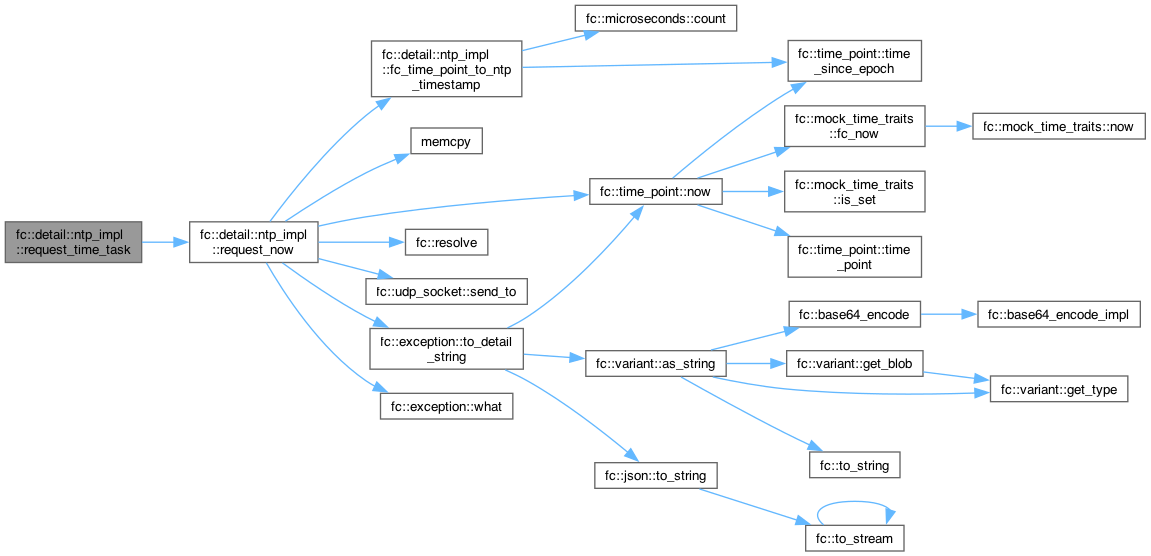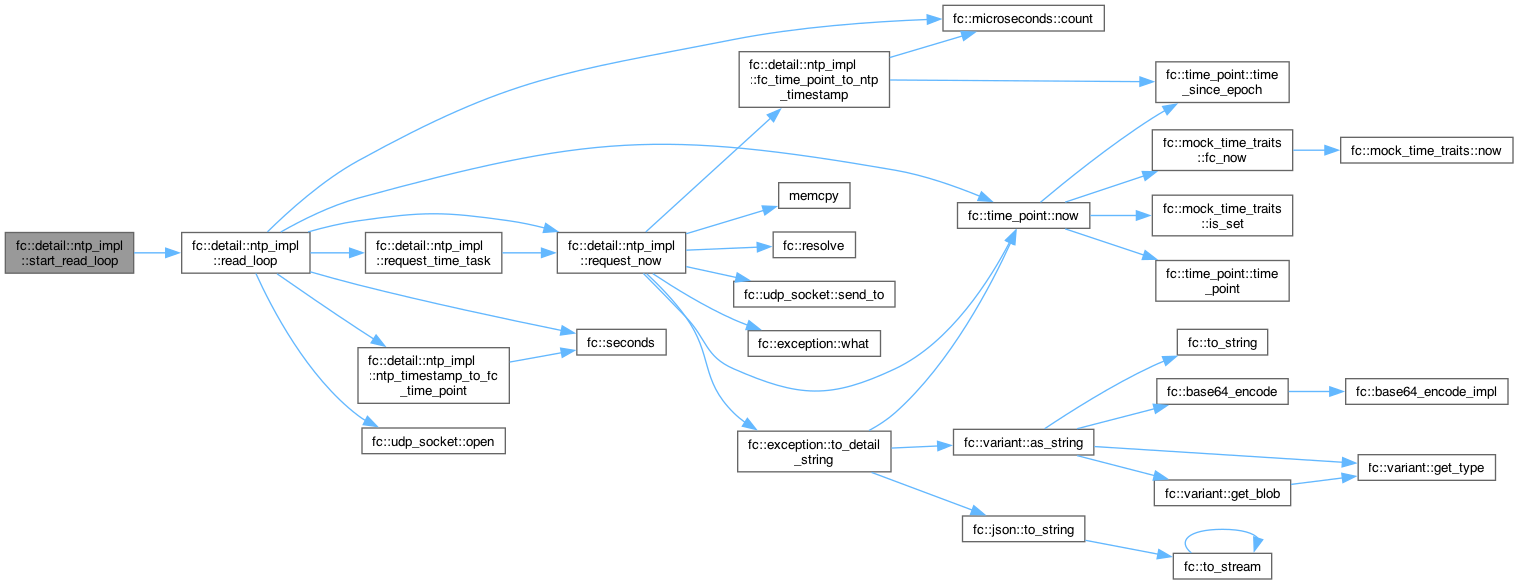Loading...
Searching...
No Matches
fc::detail::ntp_impl Class Reference
Collaboration diagram for fc::detail::ntp_impl:

Public Member Functions | |
| ntp_impl () | |
| ~ntp_impl () | |
| fc::time_point | ntp_timestamp_to_fc_time_point (uint64_t ntp_timestamp_net_order) |
| uint64_t | fc_time_point_to_ntp_timestamp (const fc::time_point &fc_timestamp) |
| void | request_now () |
| void | request_time_task () |
| void | start_read_loop () |
| void | read_loop () |
| void | reschedule () |
Public Attributes | |
| fc::thread | _ntp_thread |
| std::vector< std::pair< std::string, uint16_t > > | _ntp_hosts |
| future< void > | _read_loop_done |
| udp_socket | _sock |
| uint32_t | _request_interval_sec |
| uint32_t | _retry_failed_request_interval_sec |
| fc::time_point | _last_valid_ntp_reply_received_time |
| std::atomic_bool | _last_ntp_delta_initialized |
| std::atomic< int64_t > | _last_ntp_delta_microseconds |
| future< void > | _request_time_task_done |
| std::shared_ptr< scheduled_task_impl< void > > | _scheduled_request_time |
Detailed Description
Constructor & Destructor Documentation
◆ ntp_impl()
|
inline |
Definition at line 37 of file ntp.cpp.
37 :
40 _retry_failed_request_interval_sec(60 * 5),
42 {
45 }
std::atomic< int64_t > _last_ntp_delta_microseconds
Definition ntp.cpp:31
std::vector< std::pair< std::string, uint16_t > > _ntp_hosts
Definition ntp.cpp:23
std::atomic_bool _last_ntp_delta_initialized
Definition ntp.cpp:30
uint32_t _retry_failed_request_interval_sec
Definition ntp.cpp:27
◆ ~ntp_impl()
|
inline |
Definition at line 47 of file ntp.cpp.
48 {
51 _scheduled_request_time->cancel();
52 _scheduled_request_time->get_future().wait();
53 _scheduled_request_time.reset();
54 }
55 }
std::shared_ptr< scheduled_task_impl< void > > _scheduled_request_time
Definition ntp.cpp:35
Here is the call graph for this function:

Member Function Documentation
◆ fc_time_point_to_ntp_timestamp()
|
inline |
Definition at line 67 of file ntp.cpp.
68 {
71 uint32_t seconds_since_1900 = seconds_since_epoch + 2208988800;
72 uint32_t microseconds = microseconds_since_epoch % 1000000;
73 uint32_t fractional_seconds = (uint32_t)((((uint64_t)microseconds << 32) + (uint64_t(1) << 31)) / 1000000);
75 return bswap_64(ntp_timestamp_net_order);
76 }
constexpr const microseconds & time_since_epoch() const
Definition time.hpp:52
Here is the call graph for this function:

Here is the caller graph for this function:

◆ ntp_timestamp_to_fc_time_point()
|
inline |
Definition at line 57 of file ntp.cpp.
58 {
59 uint64_t ntp_timestamp_host = bswap_64(ntp_timestamp_net_order);
60 uint32_t fractional_seconds = ntp_timestamp_host & 0xffffffff;
61 uint32_t microseconds = (uint32_t)((((uint64_t)fractional_seconds * 1000000) + (uint64_t(1) << 31)) >> 32);
62 uint32_t seconds_since_1900 = ntp_timestamp_host >> 32;
63 uint32_t seconds_since_epoch = seconds_since_1900 - 2208988800;
65 }
Definition time.hpp:11
Definition time.hpp:42
Here is the call graph for this function:

Here is the caller graph for this function:

◆ read_loop()
|
inline |
Definition at line 137 of file ntp.cpp.
138 {
140
142 std::shared_ptr<char> receive_buffer(new char[receive_buffer_size], [](char* p){ delete[] p; });
144
145 // if you start the read while loop here, the recieve_from call will throw "invalid argument" on win32,
146 // so instead we start the loop after making our first request
149
150 while( true )
151 {
152 fc::ip::endpoint from;
153 try
154 {
155 _sock.receive_from( receive_buffer, receive_buffer_size, from );
156 // wlog("received ntp reply from ${from}",("from",from) );
158
163
164 fc::microseconds offset(((server_receive_time - origin_time) +
165 (server_transmit_time - receive_time)).count() / 2);
166 fc::microseconds round_trip_delay((receive_time - origin_time) -
167 (server_transmit_time - server_receive_time));
168 //wlog("origin_time = ${origin_time}, server_receive_time = ${server_receive_time}, server_transmit_time = ${server_transmit_time}, receive_time = ${receive_time}",
169 // ("origin_time", origin_time)("server_receive_time", server_receive_time)("server_transmit_time", server_transmit_time)("receive_time", receive_time));
170 // wlog("ntp offset: ${offset}, round_trip_delay ${delay}", ("offset", offset)("delay", round_trip_delay));
171
172 //if the reply we just received has occurred more than a second after our last time request (it was more than a second ago since our last request)
174 {
175 wlog("received stale ntp reply requested at ${request_time}, send a new time request", ("request_time", origin_time));
177 }
178 else //we think we have a timely reply, process it
179 {
181 {
182 _last_ntp_delta_microseconds = offset.count();
185 _last_valid_ntp_reply_received_time = receive_time;
187 }
188 else
191 }
192 }
194 } //end read_loop()
future< void > _request_time_task_done
Definition ntp.cpp:33
fc::time_point ntp_timestamp_to_fc_time_point(uint64_t ntp_timestamp_net_order)
Definition ntp.cpp:57
fc::time_point _last_valid_ntp_reply_received_time
Definition ntp.cpp:28
Definition ip.hpp:44
#define FC_ASSERT(TEST,...)
Checks a condition and throws an assert_exception if the test is FALSE.
Definition exception.hpp:362
#define FC_RETHROW_EXCEPTIONS(LOG_LEVEL, FORMAT,...)
Catchs all exception's, std::exceptions, and ... and rethrows them after appending the provided log m...
Definition exception.hpp:505
Here is the call graph for this function:
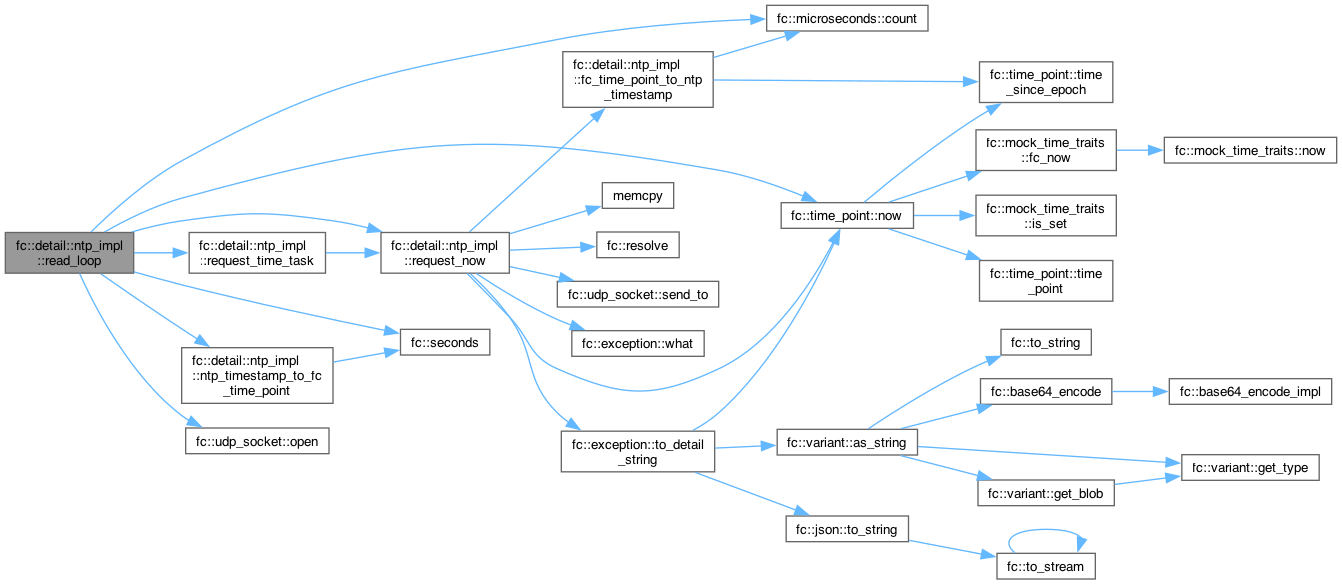
Here is the caller graph for this function:

◆ request_now()
|
inline |
Definition at line 78 of file ntp.cpp.
79 {
82 {
83 try
84 {
87 for( auto ep : eps )
88 {
91 std::array<unsigned char, 48> packet_to_send { {010,0,0,0,0,0,0,0,0} };
92 memcpy(send_buffer.get(), packet_to_send.data(), packet_to_send.size());
94 send_buf_as_64_array[5] = fc_time_point_to_ntp_timestamp(fc::time_point::now()); // 5 = Transmit Timestamp
96 break;
97 }
98 }
99 catch (const fc::canceled_exception&)
100 {
101 throw;
102 }
103 catch ( const std::bad_alloc& )
104 {
105 throw;
106 }
107 catch ( const boost::interprocess::bad_alloc& )
108 {
109 throw;
110 }
111 // this could fail to resolve but we want to go on to other hosts..
113 {
115 }
116 catch ( const std::exception& e )
117 {
119 }
120 }
121 } // request_now
uint64_t fc_time_point_to_ntp_timestamp(const fc::time_point &fc_timestamp)
Definition ntp.cpp:67
Used to generate a useful error report when an exception is thrown.
Definition exception.hpp:58
std::string to_detail_string(log_level ll=log_level::all) const
Definition exception.cpp:158
void send_to(const char *b, size_t l, boost::asio::ip::udp::endpoint &to)
Definition udp_socket.cpp:38
std::vector< boost::asio::ip::udp::endpoint > resolve(boost::asio::io_service &io_service, const std::string &host, uint16_t port)
Definition resolve.cpp:6
memcpy((char *) pInfo->slotDescription, s, l)
Here is the call graph for this function:
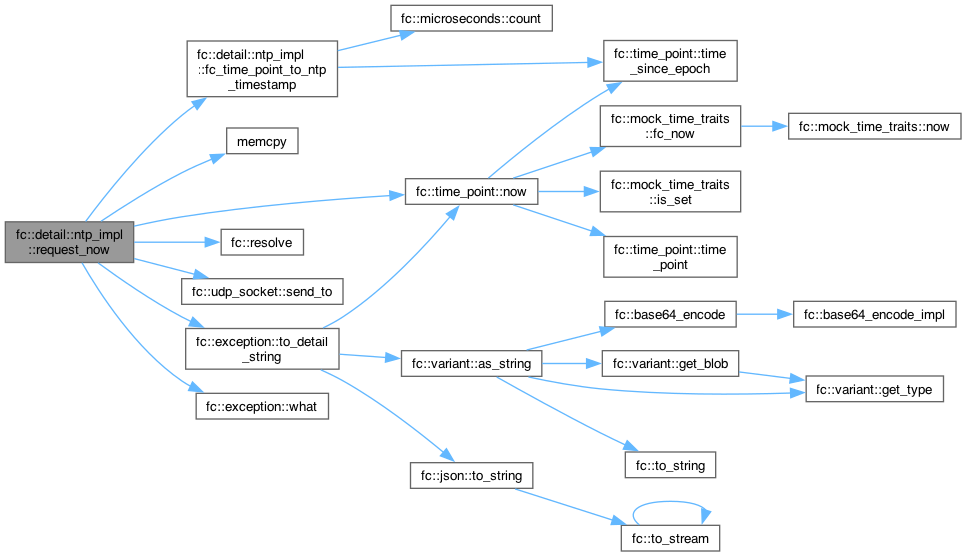
Here is the caller graph for this function:

◆ request_time_task()
|
inline |
◆ reschedule()
|
inline |
Definition at line 196 of file ntp.cpp.
196 {
198 _scheduled_request_time->cancel();
199
201 [&](){
202 request_now();
203 reschedule();
204 },
206 }
Here is the call graph for this function:
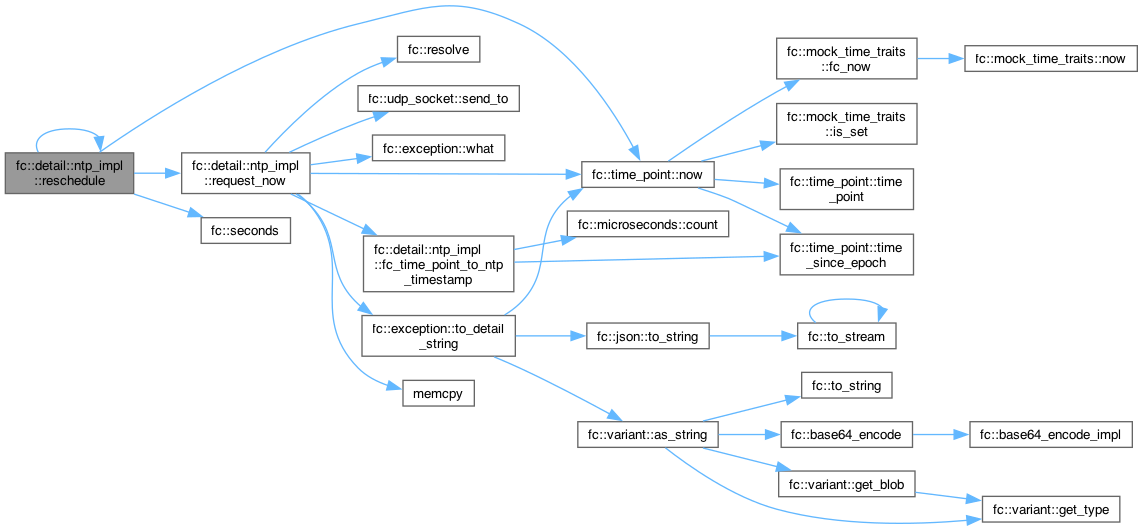
Here is the caller graph for this function:

◆ start_read_loop()
|
inline |
Member Data Documentation
◆ _last_ntp_delta_initialized
| std::atomic_bool fc::detail::ntp_impl::_last_ntp_delta_initialized |
◆ _last_ntp_delta_microseconds
| std::atomic<int64_t> fc::detail::ntp_impl::_last_ntp_delta_microseconds |
◆ _last_valid_ntp_reply_received_time
| fc::time_point fc::detail::ntp_impl::_last_valid_ntp_reply_received_time |
◆ _ntp_hosts
| std::vector< std::pair< std::string, uint16_t> > fc::detail::ntp_impl::_ntp_hosts |
◆ _ntp_thread
| fc::thread fc::detail::ntp_impl::_ntp_thread |
◆ _read_loop_done
◆ _request_interval_sec
◆ _request_time_task_done
◆ _retry_failed_request_interval_sec
| uint32_t fc::detail::ntp_impl::_retry_failed_request_interval_sec |
◆ _scheduled_request_time
| std::shared_ptr<scheduled_task_impl<void> > fc::detail::ntp_impl::_scheduled_request_time |
◆ _sock
| udp_socket fc::detail::ntp_impl::_sock |
The documentation for this class was generated from the following file:
- libraries/fc/src/network/ntp.cpp
